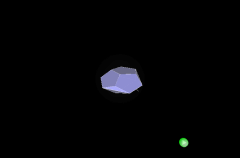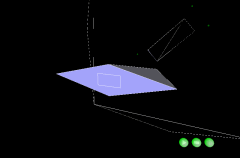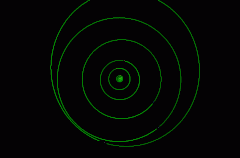|
|
||||||||||
 |  |  |
Current Research & Development being carried out at  centres on 3D visualisation. centres on 3D visualisation. | ||
| Initial results, in the form of VRML files, are presented below. Visitors who have not encountered this 3D mark-up language standard before should be aware that they will need a VRML interpreter in order to view these files. | ||
Development at  is carried out using Computer Associates International's free internet browser VRML add-on, Cosmo Player is carried out using Computer Associates International's free internet browser VRML add-on, Cosmo Player | ||
 |
 | [Cobra Mk III / Escape Capsule]† Click on the "gold" escape capsule on the underside of the vehicle to activate. |
| [Asp Hyper-Space entry]† Click on the green "play" HUD†† button to trigger the visualisation of a ship's transition into hyperspace. Note that there is a green marker arrow indicating the jump-point. |
 |
 |
[Asp Hyper-Space exit]† Click on the green "play" HUD†† button to trigger the visualisation of a ship's transition from hyperspace. Note that there is a green marker arrow indicating the jump-point. |
| [Sidewinder / Coriollis docking]† Click on the green "play" HUD†† button to re-start the ship's docking sequence. Click on the green "letterbox" HUD button to re-set the station's orientation. Click on the green "up arrow" HUD button to toggle orientation marker arrow visibility on and off. |
 |
 |
[Elite logo] Hand optimised version of John Mackay's Witch Space model. |
 | |
| [Sol System Orbital Map]† Solar System model based on that found in Frontier but with contemporary planet textures and Elite derived orbital stations.††† |
 |
 |
[Solar System] More realistic (but apparently inaccurate) representation of the orbits†††† of the Solar System's planets and the Moon based on the methods described by Paul Schlyter at his How to compute planetary positions site. |
†Please note that all ship model dimension data used in the above visualisations has been directly extracted from the original 6502 Elite binaries, using information obtained from The Elite Home Page. ††The green HUD buttons can "submarine" out of sight. If this happens adjust the viewing angle until they reappear. †††Orbits are approximated as circular and not observationally based. Orbital stations are scaled (x100) in order to improve viewability. Even so they are still difficult to examine, as are some of the outer planets' satellites, in particular the small asteriodal bodies, the viewpoints for which can be unstable and have a tendancy to "drift." ††††Orbit perturbations are ignored. For reasons not yet clear the orbital positions calculated in this model differ from those of the Interactive Solar System JAVA application at NASA's Space Academy site. | |